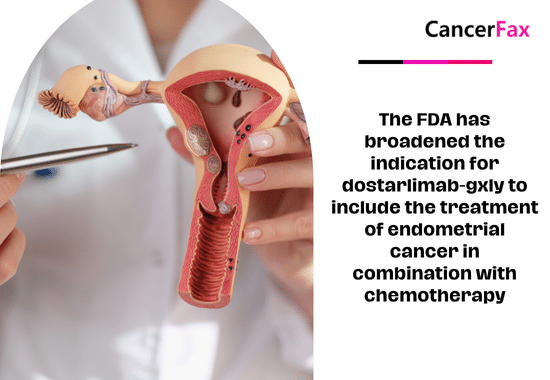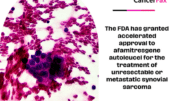August 2024: The Food and Drug Administration has granted approval for dostarlimab-gxly (Jemperli, GSK) in combination with carboplatin and paclitaxel, followed by single-agent dostarlimab-gxly, for the treatment of adult patients diagnosed with primary, advanced, or recurrent endometrial cancer (EC). Dostarlimab-gxly was originally authorized for use in combination with carboplatin and paclitaxel, followed by single-agent dostarlimab-gxly, for the treatment of primary, advanced, or recurrent endometrial cancer that is characterized by a deficiency in mismatch repair (dMMR) or high microsatellite instability (MSI-H).
Efficacy and safety
The efficacy of the treatment was assessed in a clinical experiment called RUBY (NCT03981796). This trial was undertaken in 494 patients who had primary, advanced, or recurrent EC. It was a randomized, multicenter, double-blind, placebo-controlled trial. Patients received either dostarlimab-gxly in combination with carboplatin and paclitaxel, then dostarlimab-gxly, or placebo in combination with carboplatin and paclitaxel, then placebo. The above link provides detailed information about chemotherapy regimens, including their full prescribing instructions. Randomization was stratified based on the presence of mismatch repair (MMR) or microsatellite instability (MSI), previous external pelvic irradiation, and the stage of the disease (recurrent, primary Stage III, or primary Stage IV).
The main ways to judge how well the treatment worked were progression-free survival (PFS) in the dMMR/MSI-H and overall populations, which was decided by the researcher using RECIST v1.1 criteria, and overall survival (OS) in the overall population. A statistically significant improvement in overall survival (OS) was reported in the general population. The median OS was 44.6 months (95% CI: 32.6, not attained) in the dostarlimab-gxly arm and 28.2 months (95% CI: 22.1, 35.6) in the placebo arm.
The hazard ratio was 0.69 (95% CI: 0.54, 0.89) with a one-sided p-value of 0.002. The median progression-free survival (PFS) in the entire population was 11.8 months (95% confidence interval [CI]: 9.6, 17.1). In the dostarlimab-gxly arm, the median PFS was 7.9 months (95% CI: 7.6, 9.5), whereas in the placebo arm it was also 7.9 months (95% CI: 7.6, 9.5). The hazard ratio was 0.64 (95% CI: 0.51, 0.80), indicating a lower risk of progression or death in the dostarlimab-gxly arm compared to the placebo arm. The one-sided p-value was less than 0.0001.
When dostarlimab-gxly, carboplatin, and paclitaxel were used together, the most common side effects (≥20%) were anemia, peripheral neuropathy, low white blood cell count, fatigue, nausea, hair loss, low platelet count, high glucose levels, lymphopenia, neutropenia, abnormalities in liver function tests, joint pain, rash, constipation, diarrhea, low albumin levels, abdominal pain, trouble breathing, loss of appetite, high amylase levels, urinary tract infection, and vomiting.
The immune-mediated adverse effects observed with dostarlimab-gxly were consistent with those that have been previously reported for dostarlimab-gxly. Refer to the complete prescription information for dostarlimab-gxly for a comprehensive list of adverse events.
The suggested dosage for dostarlimab-gxly is 500 mg administered every 3 weeks for a total of 6 cycles, in combination with carboplatin and paclitaxel. The next step is a monotherapy dose of 1,000 mg every six weeks for a maximum of three years, or until the disease progresses or intolerable toxicity occurs. Dostarlimab-gxly should be delivered prior to chemotherapy when given on the same day.






Advanced endometrial cancer treatment, Dostarlimab FDA approval, Dostarlimab plus chemotherapy, Endometrial cancer immunotherapy, FDA expanded indication, Gxly cancer drug, Immunotherapy for uterine cancer, PD-1 inhibitor therapy
CancerFax is the most trusted online platform dedicated to connecting individuals facing advanced-stage cancer with groundbreaking cell therapies.
Send your medical reports and get a free analysis.
🌟 Join us in the fight against cancer! 🌟
Привет,
CancerFax — это самая надежная онлайн-платформа, призванная предоставить людям, столкнувшимся с раком на поздних стадиях, доступ к революционным клеточным методам лечения.
Отправьте свои медицинские заключения и получите бесплатный анализ.
🌟 Присоединяйтесь к нам в борьбе с раком! 🌟